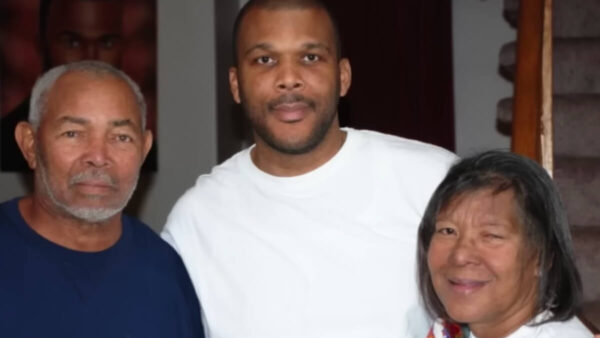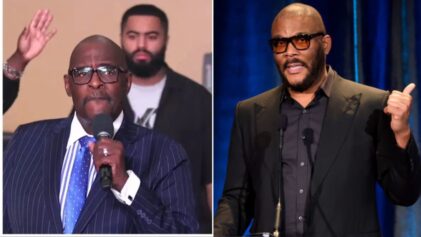Tyler Perry’s “Maxine’s Baby: The Tyler Perry Story” documentary is currently streaming on Amazon. The film documents the life of actor, filmmaker, businessman, and playwright Tyler Perry, but a dramatic scene of his abusive father yelling at a film crew has many viewers talking.
The 54-year-old movie mogul has been open in the past about his abusive childhood at the hands of his father, Emmitt Perry, while growing up in New Orleans, Louisiana. According to People magazine, the elder Perry verbally abused the documentary’s film crew when directors Armani Ortiz and Gelila Bekele traveled to Louisiana with Perry’s cousin, Lucky Johnson, in an attempt to interview him.

Bekele is Tyler Perry‘s ex-girlfriend and the mother of his 8-year-old son, Aman. She and Ortiz recalled traveling to New Orleans and having a run-in with Perry’s dad as Johnson tried to talk to his uncle. The crew reportedly had several unsuccessful attempts to contact Emmitt Perry Sr.
“Uncle Emmitt,” Johnson said as Perry Sr. yelled at the crew to “get the f–k away from here” while a crew member filmed the incident from a vehicle.
As Perry Sr. got into his own vehicle, Johnson said, “Wait a minute.”
“Get the f—k on,” replied Perry Sr. “Let’s go!”
“I called you, Uncle Emmitt,” said Johnson. “I was trying to check in on you.”
Perry Sr. continued to swear at Johnson before Johnson said, “You knew it was me, though, huh?”
“Yeah, I knew who the f—k it was,” said Perry Sr. before driving away.
“That was a difficult moment when we went to go film him and being in the car and just getting that interaction,” recalled Ortiz. “I remember calling Gelila [and saying], ‘We didn’t get it. We didn’t get the interview,’ and I was heartbroken. I was like, ‘Yo, this is going to be a chance for him to tell his truth also and to give a little bit more context as to what really happened.’ “
Ortiz added that Bekele disagreed and thought his reaction was an authentic one.
“And Bekele was like, ‘No, that’s the answer that the story needs because it’s his answer. It is what he wanted to do, and what he wanted to do is not be a part of it at all.’ ”
Bekele added that the directors wanted to give Perry Sr. a chance to “explain what happened” during Perry’s childhood and thought he either might not remember or deny Perry’s experience.
“It really made us understand the severity of what happened to Tyler,” said Bekele. “If this man has this rage at 80 plus years old, I can’t imagine how it was when he was 40, around that age with young Tyler.”
Johnson dug further into Perry’s relationship with his father at the beginning of “Maxine’s Baby” when he explained as a child, Perry was called “Junior.”
“But now it’s Tyler, you know? It’s not Emmitt. But that was his birthday name: Emmitt Perry Jr.,” said Johnson. “He changed his name to Tyler Perry, rightfully so, because he had an estranged relationship with his dad … for freaking many years.”
The film details the excessive abuse Perry endured at the hands of his father. To escape some of the beatings, he would run into a cubbyhole he created at the back of his family home in New Orleans.
Johnson said his cousin got it worse than his other siblings. He said once Perry got beat so badly that he began to draw blood and ran away to his cousin and aunt Jerry Banks. After seeing the “huge welts” on his back, Banks reportedly pulled a gun on Perry’s father. She said it wasn’t her “proudest moment.”
The “Why Did I Get Married” filmmaker has been open about his traumatic childhood. Back in 2010, he revealed to Oprah Winfrey that Perry Sr. subjected him to severe emotional and physical abuse, including beating him with a vacuum cord and tackling him after he smirked watching his father having trouble loosening the lug bolts while changing a spare tire.
“He looked up at me, and there was a smirk on my face,” he said. “All I remember is him tackling me, and I remember holding onto a chain-link fence so tight, my hands are bloody, and he’s hitting me.”
Perry also revealed that he was sexually abused by the mother of one of his friends and three men — a neighbor, a church member and a family friend. He also told Winfrey that he tried to confront his father not long before their interview, and his response was to threaten his son and seemingly take credit for his success.
“He sends a message through my brother saying, ‘If I had beat your a– one more time, you probably would have been Barack Obama,” recalled Perry.
He credits Winfrey for prompting him to seek therapy after watching an episode of “The Oprah Winfrey Show” where the talk-show host talked about the healing power of therapy.
The playwright began writing stories to deal with the abuse and became a playwright. His first play, “I Know I’ve Been Changed,” about two abused brothers, premiered in 1998.
He went on to write “I Can Do Bad All by Myself” in 2000 and introduced the portrayal of Madea, the character in Perry’s first film, “Diary of a Mad Black Woman.” The movie grossed $50 million at the box office, and Perry went on to write and direct several more films, plays and television shows.
The movie mogul revealed in 2020 that he’d taken a DNA test and found that Perry Sr. is not actually his biological father and that he “was relieved.” In the film, he explained that finding out that Perry Sr. was not his biological father was a relief because he did not want to believe that a father could be so violent to their own child.
“I was relieved because my image of a father was not somebody who could do that to a child,” said Perry.


